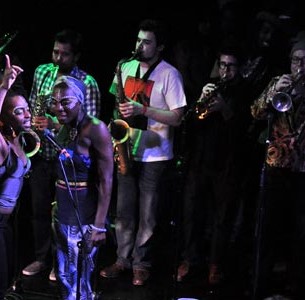
“When I’m playing the guitar parts, it’s like I’m playing Latin percussion on the guitar,” says guitarist Bryan Vargas. He’s not speaking about salsa, merengue or any Latin genre at all, but of being a member of the band playing in the acclaimed and highly-awarded Broadway musical Fela! (three 2010 Tony Awards, three sold-out months off-Broadway, eighteen months on Broadway followed by European and U.S. tours).
Vargas is in town during Chicago’s two-week run of Fela!, a musical born in 2000 when New Yorker Stephen Hendel came across the music of the iconic Nigerian artist, Fela Anikulapo Kuti. A multi-instrumentalist and composer of great genius, Kuti’s story was also one of personal tragedy in the face of an independent and activist stance against corruption in the military and Nigerian government at the time.

A New York Puerto Rican born in Brooklyn with two music degrees, Vargas is a member of the so-called ‘Fela Band’, which incorporates many other members of that city’s afrobeat band Antibalas, a band he previously formed part of at its very beginning in 1998. He filled in as Fela band’s guitarist for about fifty percent of the off-Broadway performances and about a third of the Broadway shows and is now is the full-time guitarist for the U.S. tour which began this year in September and will end in June.
There are four Latin musicians in the ten-member Fela Band, an interesting fact given that the play, which includes references to Fela Kuti’s musical influences, highlights Latin music as one of them. “Caribbean music in general”, says Vargas “was always a part of African pop music and Fela really embraced that. For the Latin part we do eight bars of “Manteca” by Dizzy Gillespie and Chano Pozo, and Fela [actor Sahr Ngaujah] cries out “Chano Pozo” to make it clear that there was a very clear, very strong influence of Afrocuban influence in Fela’s music”.
However, despite Vargas’ familiarity with those influences, playing Fela Kuti’s music hasn’t always been easy, he says: “It’s a challenge to play the music without putting your own stamp on it, the goal is to be as authentic as possible, to celebrate Fela.” He notes that nevertheless, it has been interesting to him to explore even more deeply the music of the artist he already admired: “Fela had gone to music school, and you can hear and see how the counterpoint lined up in he is brain, how each part links in and forms this puzzle. Every instrument in an African band, and in a Latin band too, is a drum. But in Africa the drums talk, they sing. It’s like the cowbells in Latin music, which comes from the Afrocuban tradition of the iron singing to the Gods. Those bells and those drums are supposed to be speaking.”

Vargas also shares stories of how the musical has touched people in the audience: “Fela was attacked by the Nigerian government in such a personal, horrible, deeply personal way. We can all relate to that, the horror of it. And just the concept of fighting to do the right thing, which we all have to do on one level or another”.
He is most of all just delighted to be a part of the experience: ”I have the best job in the world! I play music that I love, music that means something. It’s great to play something that is pretty, but it’s even better to play something that is pretty and that means something. As Fela said, music is the weapon of the future. And that’s a great thing because art has this ability to reach places that other things can’t.”
Fela! will continue through April 15 at the Oriental Theater. The Fela Band accompanied by cast members from the musical will perform at Lincoln Hall on April 7.
Featured photo: FELA! Courtesy of Farah Sosa
Mid photo: Bryan Vargas: Courtesy of the artist
Bottom photo: Sahr Ngaujah and the Broadway cast of FELA! by Monique Carmoni
Check Catalina’s blog and the archives of Beat Latino (like Beat Latino on FB too!) to explore the roots as well as trends in Latin musical arts.
